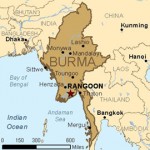Burma Questions: 7th March 2012
Asked by Baroness Goudie
To ask Her Majesty's Government what discussions they have had with European Union Commissioner Kristalina Georgieva regarding the cutting of European Union aid to the Thailand Burma Border Consortium.
Baroness Northover: Department for International Development (DfID) staff frequently discuss financial support for the Thailand Burma Border Consortium with European Commission counterparts as well as with other donors. DfID has consistently made clear that the well-being of Burmese refugees in Thailand should not be adversely affected by funding reductions.
Asked by Baroness Goudie
To ask Her Majesty's Government what funding for civil society capacity-building in Burma they provided in 2011; and what funding will be provided in 2012.
Baroness Northover: In 2011-12 the combined total expenditure on civil society capacity building in Burma was around £1.2 million. Forecast expenditure for 2012-13 is around £2 million.
Additionally, through the British embassy, the UK provided support for capacity building and for programmes on democracy, human rights and governance with funding of around £500,000 in 2011-12 to civil society in Burma.
Asked by Baroness Goudie
To ask Her Majesty's Government why some organisations working in the Thailand-Burma border that receive grants from the Department for International Development reclaim costs incurred from the Department for International Development rather than receiving a normal grant.
Baroness Northover: As standard practice the Department for International Development (DfID) does not make advance payments through grants, but instead requires organisations to reclaim costs in arrears. This helps ensure better management of British aid funds. Some organisations working in the Thailand-Burma border, on an exceptional basis, receive grants from DfID as it would be too difficult for them to operate without first receiving an advance. Before agreeing to advances full justification, on a case-by-case basis, is required. Such arrangements are kept under review to ensure that they continue to be necessary and meet the required standards of financial accountability. In all such cases our determination is to ensure the full value of British taxpayers' money.
Asked by Baroness Goudie
To ask Her Majesty's Government what funding they provide to women's organisations for projects supporting women and children who have been subjected to rape and sexual violence by the Burmese army.
Baroness Northover: The UK does not have programmes in Burma that provide direct assistance to women and children who have been raped by members of armed forces. However, the Department for International Development does provide support for legal assistance centres in Burmese refugee camps in Thailand, which can help in dealing with rape cases.
During Burma's Universal Periodic Review session at the UN, the UK urged the Government to end impunity for human rights violations. At the Human Rights Council in March and the UN General Assembly in November, the UK supported text that strongly called on the Government to take urgent measures to end the targeting of civilians in military operations, and rape and other forms of sexual violence.
Asked by Baroness Goudie
To ask Her Majesty's Government what recent meetings Department for International Development officials have held with civil society organisations from Burma that are based on the Thailand-Burma border.
Baroness Northover: Department for International Development (DfID) officials regularly meet with civil society organisations and non-government organisations based along both sides of the Thailand-Burma border, both bilaterally and at meetings of the Committee for the Co-ordination of Services to Displaced Persons in Thailand. Most recently DfID officials attended the Committee for the Co-ordination of Services to Displaced Persons on 26 January, and met bilaterally with the Thailand-Burma Border Consortium in February.
